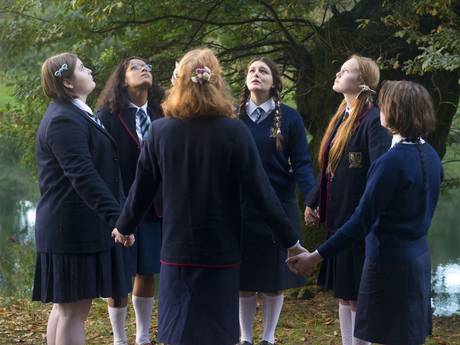The Falling
****
Dir: Carol
Morley. With: Maxine Peake, Maisie Williams, Florence Pugh, Anna Burnett, Greta
Scacchi, Rose Caton, Lauren McCrostie, Katie Ann Knight, Monica Dolan, Mathew
Baynton, Morfydd Clark, Joe Cole. 15 cert, 102 min
What strikes you first is that they know too much. From the slow fades, lingering looks and free-associative edits that open The Falling, we infer that the schoolgirls drifting across the
frame aren’t the empty vessels their teachers assume. It’s the early 1960s, and sex is moistening even the Home Counties’ drier regions; “magic-with-a-k”, as somebody puts it, is
in the air. These girls have butterflies in
their stomachs and ants in their pants, so the fainting epidemic they
subsequently succumb to almost seems organic: willingly or otherwise, our ethereal
heroines are soon dropping like bluebottles into
Mother Nature’s welcoming arms.
Carol Morley’s potently suggestive follow-up to 2011’s Dreams of a Life floats multiple
interpretations for these
curious collapses. The most reductive – mass hysteria – comes, inevitably, from the school’s science bloke (Mathew Baynton): “It’s just a few neurotic types.” Yet the girls’
fainting during a
fusty WI talk starts to resemble defiant collective action, a means of rejecting the housewifely
poise being drilled into them. (One spark out, all spark out.) Either
way, we note, Morley’s youngsters
seize the moment, and the attention, in ways
their hollowed-out elders – wistful head Greta Scacchi, eerily lacquered shut-in Maxine Peake – no longer appear able to.
Credit ace casting director Shaheen Baig (Peaky Blinders,
X+Y) with sourcing these diverse looks and personalities, and assisting in the creation of one indelible friendship. Florence Pugh’s Abbie
combines teen-queen bearing with the vulnerability of one still unsure of her own body: like a
homegrown Laura Palmer, her presence hovers over even those
scenes from
which she’s absent. Maisie
Williams may be more familiar – she’s Arya Stark on Game of Thrones – yet her Lydia’s something new: a
wildflower left to grow toxic, snuggling closer to
her BFF by
seducing Abbie’s most recent lover. Dodgy call,
considering he’s her own brother.
Such complications account
for the film’s intensity of feeling, which hails from another era
entirely. Morley keeps eliding and pausing time,
deploying Tracey Thorn’s spare yet keening songs in dreamy montages that recall
such folk-cinema one-offs as The Wicker Man. For all The Falling’s period trimmings, its
uncanny power resides in these ellipses and blackouts – in elements that cannot be easily rationalised. Retaining
Nic Roeg’s son Luc as producer suggests Morley intends some continuation of those
notes of otherness Performance
and Don’t Look Now secreted about the British cinema: seizing
a moment herself, she’s made a film that swoons with a similar artistic purpose.
The Falling opens in selected cinemas from today.

No comments:
Post a Comment